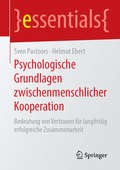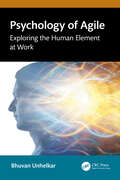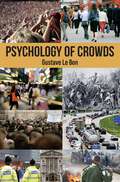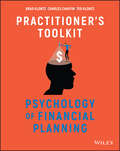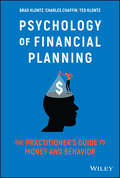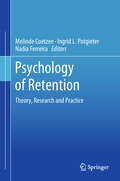- Table View
- List View
Psychologie im Projektmanagement: Projektleitung in komplexen Organisationen
by Christoph LüttgeSie leiten ein komplexes Projekt, wenden SCRUM und agile Managementmethoden an, machen auch sonst alles richtig und trotzdem gibt es Unzufriedenheit unter den Stakeholdern? Dieses Fachbuch über Projektmanagement bietet Ihnen praxistaugliche Lösungen zu Vertrauensbildung und Motivation und führt Sie dabei in einmaliger Weise durch die psychologischen Untiefen von Risiken und Krisen sicher zum Erfolg. Von theoretischen Fundamenten wie der Motivations-, Organisations- und Kommunikationspsychologie wird der Bogen zum unternehmenspolitischen Umfeld gespannt, in dem Sie sich als Projektleitung bewegen. Aus seiner eigenen, über 25-jährigen Projekterfahrung reichert der Autor jedes Thema mit Darstellungen konkreter Managementsituationen aus der Praxis an, in denen Sie sich wiederfinden werden. Fragen und Antworten zum Selbsttest sind über die Flashcard App inkludiert. Ihren persönlichen Code finden Sie im Buch. Zielgruppen: Das Buch wendet sich an Projektleitungen und Führungskräfte, an Neueinsteiger genauso wie an erfahrene Profis, die kontinuierlich ihren Führungsstil weiterentwickeln wollen.
Psychologie von Risiko und Vertrauen: Wahrnehmung, Verhalten und Kommunikation
by Philipp Henrizi Jörn BaselPsychologie von Risiko und Vertrauen Unsicherheit und Unplanbarkeit nehmen zu, globale Krisen, Fake News und Skepsis erodieren bestehendes Vertrauen. Zusätzlich wird diese Dynamik durch technologische Entwicklungen befeuert, deren Akzeptanz maßgeblich von einer subjektiven Bewertung der Chancen und Risiken abhängt. Risikokompetenz, Risikomündigkeit oder auch Vertrauensaufbau sind hierbei zentrale Schlagwörter, welche exemplarisch für einen fundierten Umgang mit Risiko und Vertrauen stehen. Dieses Buch bietet Ihnen in 11 Kapiteln eine praxisorientierte Einführung in die Psychologie von Risiko und Vertrauen. Sie vertiefen Ihre Kenntnisse über Risikokommunikation im Krisenfall, den Umgang mit Misstrauen und auch wie es gelingt Vertrauen als entscheidendes Bindeglied zu etablieren, um Innovation und Fortschritt zu ermöglichen.Die didaktisch eingängig strukturierten Inhalte mit Lernzielen und Kontrollfragen stützen sich auf bewährte psychologische und aktuelle wissenschaftliche Erkenntnisse. Vielfältige Praxisbeispiele, wie z.B. von einer Extremsportlerin, einem Flight Safety Officer und einem katholischen Missbrauchsaufklärer, vermitteln einen persönlichen Bezug und zeigen Ihnen, wie vielschichtig sich der Umgang mit Risiko und Vertrauen gestalten kann. Dazu erhalten Sie hilfreiche Zusatzmaterialien über die Begleitwebseite. Kapitel 4 ist unter einer Creative Commons Attribution 4.0 International License über link.springer.com frei verfügbar (Open Access).Zielgruppen Studierende der Wirtschaftspsychologie und anderer Studiengänge im Bereich Wirtschaft, Entscheidungsträger, Führungskräfte und alle, die sich für den Umgang mit Risiko und Vertrauen interessieren.Zu den Herausgebern Prof. Dr. Jörn Basel – Professor für Wirtschaftspsychologie an der Hochschule Luzern (HSLU). Mitglied des First International Network on Trust (FINT). Seine Forschung beschäftigt sich unter anderem damit, wie Organisationen verlorenes Vertrauen wiederaufbauen können. Prof. Dr. Philipp Henrizi – Professor und Programmleiter Governance, Risk and Compliance der Hochschule Luzern (HSLU). Diverse Forschungsprojekte und Publikationen im Bereich Risk Management und Compliance Management. Mitglied im European Risk Research Network (ERRN).
Psychologische Anforderungsanalysen in Theorie und Praxis: Für Führungskräfte und Personalmanager, die Anforderungsprofile erheben wollen (essentials)
by Heribert WienkampPsychologische Anforderungsanalysen zeigen mit ihren Anforderungs- und Qualifikationsprofilen, worauf es zukünftig bei der Arbeit ankommt! Profitieren soll von diesen Informationen, die durch einen Methodenmix aus z. B. Fragebögen und „Expertengesprächen“ vor Ort zuvor zu erheben sind, sowohl die Bewerberauswahl als auch die Schulung des Personals, wie es sich z. B. angesichts neuer strategischer Herausforderungen im Finanzierungsgeschäft einer Bank ergab. Anhand ausgewählter Personalkennzahlen aus der operativen Personalarbeit ist zu prüfen, ob die aktuelle Personalstrategie „noch auf Kurs“ ist.
Psychologische Anforderungsanalysen: Anforderungsprofile für Management, Arbeit und Business
by Heribert WienkampAnforderungsprofile scheinen auf Personalverantwortliche einen magischen Einfluss auszuüben, denn sonst wären sie für strategische Entscheidungen im Personalmanagement nicht so gefragt. Für Sie als potenzieller Nutzer ist entscheidend, weniger nach dem „universell talentierten Mitarbeiter“ zu fahnden, den es im Übrigen so gar nicht gibt, sondern die aktuelle und zukünftige Personalqualität im Unternehmen festzustellen In diesem Buch erhalten Sie einen Überblick über die mit Anforderungsstrukturen korrespondierenden Instrumente des Personalmanagements wie z.B. Förderkonzepte, Seminarangebote oder Tests. Außerdem werden Ihnen psychologische Erkenntnisse über geschäftlich motiviertes Denken und Handeln vermittelt. Dazu kommt, dass die hier vorgestellte psychologische Anforderungsanalyse nicht nur der Personalauslese und der Personalentwicklung in ihren Kernaufgaben von Nutzen sein wird, sondern ebenso neue Wege zur Identifizierung erfolgskritischer Business-Anforderungen aufzeigen kann. Business-Anforderungen sind z.B. in undurchsichtigen Situationen, wo es auf politische Kalküle und taktisches Geschick ankommt, aber auch bei Einführung moderner Managementsysteme und IT-Technologien (inkl. Social Media) allgegenwärtig und nicht wegzudenken. Zielgruppen: Führungskräfte, Personalreferenten und Arbeitsanalytiker und alle diejenigen, die sich mit Personalfragen, Arbeits- und Anforderungsanalysen, und strategischen Managementthemen beschäftigen. Zum Autor: Heribert Wienkamp ist Dipl.-Psychologe, PhD, Betriebswirt (grad.), berufliche Tätigkeit in verschiedenen Funktionen im Personalbereich einer Bank.
Psychologische Auswirkungen von Change Prozessen: Widerstände, Emotionen, Veränderungsbereitschaft und Implikationen für Führungskräfte (essentials)
by Miriam Landes Eberhard SteinerNotwendige Veränderungen brechen sich immer Bahn. Verpasst man als Unternehmen den richtigen Zeitpunkt, so gleicht die Veränderung oftmals einem Vulkanausbruch. Ist die Veränderungsnotwendigkeit jedoch bereits für jeden erkennbar, fehlt die Kraft für einen notwendigen Change. In diesem Beitrag werden die Ausprägungen von Veränderungen systematisiert. Daraus leiten sich neun Veränderungssituationen ab, aus der sich die Herangehensweise im Veränderungsmanagement ergeben. Abhängig von der Radikalität des Eingriffes entwickeln sich bei jeder Veränderung unterschiedlich starke Widerstände. Diese Widerstände werden analysiert und Möglichkeiten für Führungskräfte zur Gestaltung der Veränderung aufgezeigt.
Psychologische Grundlagen zwischenmenschlicher Kooperation: Bedeutung von Vertrauen für langfristig erfolgreiche Zusammenarbeit (essentials)
by Helmut Ebert Sven PastoorsDieses essential erläutert die psychologischen Grundlagen der zwischenmenschlichen Kooperation: Was veranlasst uns, mit anderen Menschen zusammenzuarbeiten? Welche Faktoren führen zum Erfolg? Und warum versuchen wir immer wieder, unser Gegenüber zu übervorteilen? Zudem erfahren die Leser, wieso Menschen, die mit anderen kooperieren, mehr Erfolg im Leben haben, welche Faktoren über den Erfolg einer Kooperation entscheiden und welche Bedeutung Vertrauen und Respekt für den Erfolg von Kooperationen haben. Dabei wird jedem der Faktoren ein eigenes Kapitel gewidmet, in dem diese anhand praktischer Beispiele erläutert werden.
Psychologische Gutachtenerstellung: Für Studium und Beruf – zum Einsatz in verschiedenen Anwendungsfeldern
by Philipp Yorck Herzberg Swetlana WildfangDieses einzigartige Lehrbuch ist unverzichtbar für Psychologiestudierende sowie für Professionals, die sich mit der psychologischen Gutachtenerstellung beschäftigen. Darin finden Sie eine systematische Übersicht und Anleitung zur Gutachtenerstellung in den wichtigsten Anwendungsfeldern der psychologischen Begutachtung. Hier erfahren Sie alle relevanten Aspekte für die Gutachtenerstellung, wie Grundlagen, rechtliche Rahmenbedingungen, Verfahren und diagnostische Strategien sowie Entscheidungsmodelle. Ein besonderes Highlight ist die detaillierte Darstellung der spezifischen Nuancen der diagnostischen Anwendungsfelder wie Eignungsdiagnostik, Klinische und Pädagogische Psychologie, Begutachtung in der Rechts- und Verkehrspsychologie sowie Sachverständigengutachten für das Familiengericht bezüglich Sorge- und Umgangsrechtsfragen. Alles wird mit vollständigen Beispielgutachten veranschaulicht. Die Autoren, beide seit über zwei Jahrzehnten mit der psychologischen Gutachtenerstellung vertraut, teilen ihr profundes Wissen und ihre Erfahrung aus zahlreichen Lehrveranstaltungen sowie der Erstellung zahlreicher Gutachten zu einer Vielzahl unterschiedlicher Fragestellungen. Ihre Erkenntnisse und Rückmeldungen aus Lehre und Praxis haben sie dazu inspiriert, ihre Expertise in diesem Lehrbuch für Studierende, Psychologen und auch diejenigen, die psychologische Gutachten nutzen (wie Richter, Anwälte, Familienmediatoren und andere nichtpsychologische Auftraggeber), zugänglich zu machen.
Psychologische Selbsthilfe bei Mobbing: Zuversicht, Vertrauen, Veränderung (essentials)
by Christa KolodejChrista Kolodej stellt anhand von zehn Themen wichtige Konzepte und zahlreiche #65533;bungen vor, die dem Erhalt der psychischen und physischen Gesundheit bei Mobbing dienen. Hierbei geht es u. a. um die St#65533;rkung positiver mentaler Einstellungen oder die M#65533;glichkeit, sich entspannen zu k#65533;nnen. Auch strategische Aspekte werden von der Autorin ber#65533;cksichtigt. Die gelungene Vermittlung von schwierigen Gespr#65533;chsinhalten, das Treffen von nachhaltigen Entscheidungen oder das angemessene Abschlie#65533;en erlebter Belastungen, um sich neu und unbelastet der eigenen Zukunft zu widmen, sind ebenfalls wichtige Themen dieses Buches. Es ist nicht immer m#65533;glich, Mobbing g#65533;nzlich zu vermeiden, sind die Prozesse doch oft so subtil, dass sie schwer sofort erkannt werden k#65533;nnen. Mobbingbetroffene k#65533;nnen nicht immer verhindern, dass sie in die Opferrolle gedr#65533;ngt werden; ob sie diese annehmen, entscheiden sie jedoch selbst!
Psychologische Sicherheit in Unternehmen: Wie Hochleistungsteams Wirklich Funktionieren (Essentials)
by Ina Goller Tanja LauferIna Goller und Tanja Laufer erklären in diesem essential, wie Führungskräfte den wichtigsten Erfolgsfaktor für Teamperformance – das Konzept „Psychologische Sicherheit“ – in ihrem Unternehmen etablieren. Die Autorinnen geben einen kompakten Überblick, erläutern den wissenschaftlichen Hintergrund und zeigen die positiven Effekte auf die Teamleistung auf. Sie geben wertvolle Umsetzungshilfen für alle Führungskräfte wie Team- und Projektleiter sowie Personalentwickler, um die Fehlerkultur und Innovationsfähigkeit im Team und damit im Unternehmen zu stärken.
Psychologische Sicherheit in Unternehmen: Wie Hochleistungsteams wirklich funktionieren (essentials)
by Ina Goller Tanja LauferIna Goller und Tanja Laufer erklären in diesem essential, wie Führungskräfte den wichtigsten Erfolgsfaktor für Teamperformance – das Konzept „Psychologische Sicherheit“ – in ihrem Unternehmen etablieren. Die Autorinnen geben einen kompakten Überblick, erläutern den wissenschaftlichen Hintergrund und zeigen die positiven Effekte auf die Teamleistung auf. Sie geben wertvolle Umsetzungshilfen für alle Führungskräfte wie Team- und Projektleiter*innen sowie Personalentwickler*innen, um die Fehlerkultur und Innovationsfähigkeit im Team und damit im Unternehmen zu stärken.
Psychologische Sicherheit: Impulse zur Integration in die Unternehmenskultur (essentials)
by Melanie Meyer-Tischler Melanie FaltermeierMelanie Faltermeier und Melanie Meyer-Tischler beleuchten die Bedeutung psychologischer Sicherheit für eine moderne Unternehmenskultur und greifen dabei auf die Pionierarbeit von Amy Edmondson zurück. Sie zeigen praxisnah, wie psychologische Sicherheit auf Unternehmens-, Führungs- und Mitarbeiterebene gefördert werden kann und betonen die Verknüpfung mit der psychischen Gefährdungsbeurteilung als strategisches Instrument. Zudem wird die Rolle von Künstlicher Intelligenz (KI) in der Arbeitswelt diskutiert, einschließlich ihrer Chancen und Herausforderungen.
Psychologisches Konfliktmanagement: Professionelles Handwerkszeug für Fach- und Führungskräfte (essentials)
by Werner Schienle Andreas SteinbornSie wollen mit Konflikten (noch) besser umgehen k#65533;nnen? Sie m#65533;chten wissen, wie Sie Ihre Interessen umsetzen, ohne dabei Scherbenhaufen in Ihren Beziehungen zu Kollegen, Vorgesetzten, Mitarbeitern oder auch im Bekannten- und Freundeskreis zu hinterlassen? Hier erfahren Sie es. In diesem essential finden Sie nicht nur jede Menge handfester und leicht im Alltag einsetzbarer Tools, sondern Sie gewinnen auch wertvolle Einblicke in konfliktf#65533;rdernde menschliche Denk- und Wahrnehmungsprozesse, deren Ber#65533;cksichtigung Ihr Leben um vieles einfacher macht. Weniger Kleinkriege, daf#65533;r mehr Zeit und Energie f#65533;r Ihre eigentlichen T#65533;tigkeiten.
Psychologisches Konfliktmanagement: Professionelles Handwerkszeug für Fach- und Führungskräfte (essentials)
by Werner Schienle Andreas SteinbornSie wollen mit Konflikten (noch) besser umgehen können? Sie möchten wissen, wie Sie Ihre Interessen umsetzen, ohne dabei Scherbenhaufen in Ihren Beziehungen zu Kollegen, Vorgesetzten, Mitarbeitern oder auch im Bekannten- und Freundeskreis zu hinterlassen? Hier erfahren Sie es. In dieser zweiten Auflage des essentials, welches sich gleich in der ersten Auflage als Standardwerk etabliert hat, finden Sie nicht nur jede Menge handfester und leicht im Alltag einsetzbarer Tools, sondern Sie gewinnen auch wertvolle Einblicke in konfliktfördernde menschliche Denk- und Wahrnehmungsprozesse, deren Berücksichtigung Ihr Leben um vieles einfacher macht. Weniger Kleinkriege, dafür mehr Zeit und Energie für Ihre eigentlichen Tätigkeiten.
Psychology Applied To Work
by Paul Muchinsky Satoris HowesThe 12th edition of Psychology Applied to Work presents the story of I/O psychology as told through the most recent research, summarized in a focused and easy-to-comprehend manner. Five special features appearing throughout the book highlight the impact of I/O psychology on key contemporary issues and are designed to enhance student engagement in the field.
Psychology Applied to Work
by Paul M. MuchinskyA textbook on industrial and organizational psychology.
Psychology and Behavioral Economics: Applications for Public Policy
by Kai RuggeriPsychology and Behavioral Economics offers an expert introduction to how psychology can be applied to a range of public policy areas. It examines the impact of psychological research for public policymaking in economic, financial, and consumer sectors; in education, healthcare, and the workplace; for energy and the environment; and in communications. Your energy bills show you how much you use compared to the average household in your area. Your doctor sends you a text message reminder when your appointment is coming up. Your bank gives you three choices for how much to pay off on your credit card each month. Wherever you look, there has been a rapid increase in the importance we place on understanding real human behaviors in everyday decisions, and these behavioral insights are now regularly used to influence everything from how companies recruit employees through to large-scale public policy and government regulation. But what is the actual evidence behind these tactics, and how did psychology become such a major player in economics? Answering these questions and more, this team of authors, working across both academia and government, present this fully revised and updated reworking of Behavioral Insights for Public Policy. This update covers everything from how policy was historically developed, to major research in human behavior and social psychology, to key moments that brought behavioral sciences to the forefront of public policy. Featuring over 100 empirical examples of how behavioral insights are being used to address some of the most critical challenges faced globally, the book covers key topics such as evidence-based policy, a brief history of behavioral and decision sciences, behavioral economics, and policy evaluation, all illustrated throughout with lively case studies. Including end-of-chapter questions, a glossary, and key concept boxes to aid retention, as well as a new chapter revealing the work of the Canadian government’s behavioral insights unit, this is the perfect textbook for students of psychology, economics, public health, education, and organizational sciences, as well as public policy professionals looking for fresh insight into the underlying theory and practical applications in a range of public policy areas.
Psychology and Work: An Introduction to Industrial and Organizational Psychology
by Berrin Erdogan Donald M. Truxillo Talya N. BauerPsychology and Work is a new edition of the award-winning textbook written for introductory Industrial and Organizational (I-O) Psychology classes. This book makes the core topics of I-O Psychology clear, relevant, and accessible to students through its dynamic design. The real-world examples from the perspectives of employees and employers highlight how I-O Psychology is applied to today’s workplace. Psychology and Work, Second Edition covers the core areas of I-O Psychology including an overview of the field and its history. The topics covered include up-to-date research methods and statistics; job analysis and criterion measurement; performance appraisal; personnel selection; training and development; work motivation; leadership; job attitudes and emotions, occupational health psychology, safety, and stress; teams; and organizational structure, culture, and change. Throughout the text, an emphasis is placed on essential issues for today’s workplace such as diversity and inclusion, the evolving role of big data and analytics, legal issues, and the changing nature of work. Written by dedicated I-O professors with expertise in I-O Psychology and teaching this course, the book and supporting materials provide a range of high-quality pedagogical materials, including interactive features, quizzes, PowerPoint slides, numerous case studies, recommended videos, and an expanded, high-quality test bank.
Psychology at Work
by Dr Peter B WarrApplied psychology in work settings has made considerable progress in the 30 years since the original version of this book was published. This new collection of essays aims to illustrate both the empirical and practical richness of the field as wellas its theoretical development. The chapters cover psychological processes, the study of groups and workteams, and the nature of complex organizations as a whole. Reflecting recent developments in psychology as well as society generally, topics range from skill and workload, shiftwork, personnel selection, training and careers, and the effects of new technology, leadership and management, to job stress and well-being, women in employment, corporate culture and processes of organizational change.
Psychology of Agile: Exploring the Human Element at Work
by Bhuvan UnhelkarAgile is a mindset and a culture that has evolved beyond software development to encompass all forms of project management, business organizations, defense, and society. In today’s fast- paced and ever- changing world, adopting an Agile approach is essential for organizations to thrive and maintain competitiveness. This book aims to extend the concept of Agility beyond the four declarations of the Manifesto and apply it to various projects, organizations, and even society. The book delves into the intricacies of Agile and highlights its significance in modern workplaces. It emphasizes that Agile is more than just a set of tools and techniques; it is a way of thinking and a culture that requires a deep understanding of psychology and sociology. Key topics discussed: Agility as a leadership characteristic and the meta- mind of Agile • Agile mind- map beyond the manifesto and methods Psychological frameworks (Maslow, TA, MBTI, Left- Right, Slow- Fast) relevant to Agile work and psychosocial games at work Psychological development and Composite Agile Method and Strategy (CAMS) Agile organizational structures and behaviors Agile Transformations in the Digital Age This book is valuable for Agile coaches, mentors, and Scrum Masters looking for more comprehensive answers than what an Agile framework can provide. It is also helpful for business leaders, stakeholders, and product owners who need to deal with ambiguous or unclear issues, as well as project managers and team leaders who already have experience in Agile but feel like something is missing. Additionally, HR professionals and trainers involved in Agile transformation can benefit from this book.
Psychology of Crowds
by Gustave Le BonIn this clear and vivid book, Gustave Le Bon throws light on the unconscious irrational workings of group thought and mass emotion as he places crowd ideology in opposition to free-thinking and independent minded individuals. He also shows how the behaviour of an individual changes when she/he is part of a crowd.Le Bon was an eminent psychologist and sociologist. The ideas le Bon explores in this book are extremely relevant to today's society and were of pivotal importance in the early years of group psychology: Sigmund Freud's Massenpsychologie und Ich-Analyse (1921); (English translation Group Psychology and the Analysis of the Ego, 1922) was based on Le Bon's work. Applications include financial market behaviour and political delusions.The original of this work, La Psychologie des Foules, was first translated anonymously into English possibly by a group of French students. Sparkling Books has corrected errors and anomalies in the original translation by reference to the Alcan edition. We have shortened a few passages but maintained the original footnotes and have added some footnotes of our own. Contents>Book One - The Mind of Crowds General characteristics of crowds and the psychological law of their mental unity The sentiments and morality of crowds The ideas, reasoning power, and imagination of crowds The religious nature of crowd convictions Book Two - The Opinions and Beliefs of Crowds Indirect factors of the opinions and beliefs of crowds Direct factors of the opinions of crowds The leaders of crowds and their means of persuasion Fixed beliefs and changeable opinions of crowds Book Three - The Classification and Description of the Different Kinds of Crowds The classification of crowds Crowds committing crimes Criminal juries Electoral assemblies
Psychology of Financial Planning: Practitioner's Toolkit
by Brad Klontz Ted Klontz Charles R. ChaffinTools to help financial planners become more effective Psychology of Financial Planning: Practitioner's Toolkit is a practical, hands-on companion resource to the authors' Psychology of Financial Planning. It brings assessments, reflection and exercises that helps the financial planner better understand their own biases and behaviors as well as those of their clients. The Practitioner’s Toolkit includes exercise related to all of the learning objectives in the Psychology of Financial Planning that are found on the CFP® Exam. This Practitioner's Toolkit offers a collection of tools designed to expand on aspects of the companion book, including assessments and exercises financial planners can use with their clients. It guides readers through the application of concepts explored in the Psychology of Financial Planning and encourages discussion and sharing with clients and members of planning firms. Readers will also find: Tools and strategies to assist the financial planner in understanding client and planner attitudes, values, and biases, Explorations of multicultural competence, behavioral finance, and helping client’s navigate crisis events across a broad range of circumstances and financial planning clients, Exercises that focus on resolving common sources of money conflict, avenues to get the client to take action, client goal-setting, and principles of effective communication and facilitating change. Designed for current and aspiring financial planning professionals and educators in financial planning across roles and business models, The Psychology of Financial Planning: Practitioner’s Toolkit is a must-have on bookshelves of practitioners from firms large and small.
Psychology of Financial Planning: The Practitioner's Guide to Money and Behavior
by Brad Klontz Ted Klontz Charles R. ChaffinPsychology of Financial Planning: The Practitioner&’s Guide to Money and Behavior In PSYCHOLOGY OF FINANCIAL PLANNING: The Practitioner&’s Guide to Money and Behavior, distinguished authors Drs. Brad Klontz, CFP®, Charles Chaffin, and Ted Klontz deliver a comprehensive overview of the psychological factors that impact the financial planning client. Designed for both professional and academic audiences, PSYCHOLOGY OF FINANCIAL PLANNING is written for those with 30 years in practice as well as those just beginning their journey. With a focus on how psychology can be applied to real-world financial planning scenarios, PSYCHOLOGY OF FINANCIAL PLANNING provides a much-needed toolbox for practicing financial planners who know that understanding their client&’s psychology is critical to their ability to be effective. The PSYCHOLOGY OF FINANCIAL PLANNING is also a much-needed resource for academic institutions who now need to educate their students in the CFP Board&’s newest category of learning objectives: psychology of financial planning. Topics include: Why we are bad with money Client and planner attitudes, values, & biases Financial flashpoints, money scripts, and financial behaviors Behavioral finance Sources of money conflict Principles of counseling Multicultural competence in financial planning General principles of effective communication Helping clients navigate crisis events Assessment in financial planning Ethical considerations in the psychology of financial planning Getting clients to take action Integrating financial psychology into the financial planning process PSYCHOLOGY OF FINANCIAL PLANNING goes beyond just theory to show how practitioners can use psychology to better serve their clients. The accompanying workbook provides exercises, scripts, and workshop activities for firms and practitioners who are dedicated to engaging and implementing the content in meaningful ways.
Psychology of Hope: You Can Get Here from There
by C.R. SnyderWhy do some people lead positive, hope-filled lives, while others wallow in pessimism? In The Psychology of Hope, a professor of psychology reveals the specific character traits that produce highly hopeful individuals. He offers a test to measure one's level of optimism and gives specific advice on how to become a more hopeful person.
Psychology of Retention: Theory, Research And Practice
by Melinde Coetzee Ingrid L. Potgieter Nadia FerreiraThis book offers a contemporary review of talent retention from the viewpoint of human resource management and industrial/organisational psychology. With a practical and relevant perspective it enriches critical knowledge and insight in the psychology of talent retention. It offers interpretation of difficult factors facing organisations such as the conceptualisation of talent, the forecasting of talent demand and supply, external and internal factors that influence talent attraction, development and retention, the alignment between talent management and business strategy. Also covered is the implementation of human resource practices and strategies in response to the needs of different organisational contexts and workforce characteristics. The chapter contributions will not only enrich knowledge and insight in the complex phenomenon of talent retention, but also advance new original ways of thinking and researching this critically important area of inquiry. The book is intended for graduate students and researchers as an overview of the topic of talent retention, practitioners will also find it informative.
Psychology of Sustainability and Sustainable Development in Organizations
by Cary L. Cooper Annamaria Di FabioThis volume answers calls for improving sustainability and sustainable development in organizations from a psychological point of view. It offers a range of perspectives on the current research in the psychology of sustainability and sustainable development to highlight effective ways of improving well-being and healthy sustainable development in organizations. Section 1 introduces the concept of the psychology of sustainability and sustainable development as well as macro topics of related issues in organizations. Section 2 focuses on themes traditionally recognized in organizational psychology literature, such as performance, negotiation, leadership, resistance to change, innovation, and digital transformation. Section 3 presents variables to enhance sustainability and sustainable development in organizations and considers levels of prevention. Topics include humor awareness as a primary prevention resource in organizations, intrapreneurial self-capital as an individual preventative strength, compassion within organizations, perfectionism as an inhibitor in organizational contexts, and job crafting from individual to collaborative to organizational, meaningfulness and sustainable careers. With a clear psychological focus on the topic of leading sustainability efforts, this book will be of great interest to students and academics who want to learn more about corporate sustainability. It is also a useful resource for business executives, team leaders and managers.





